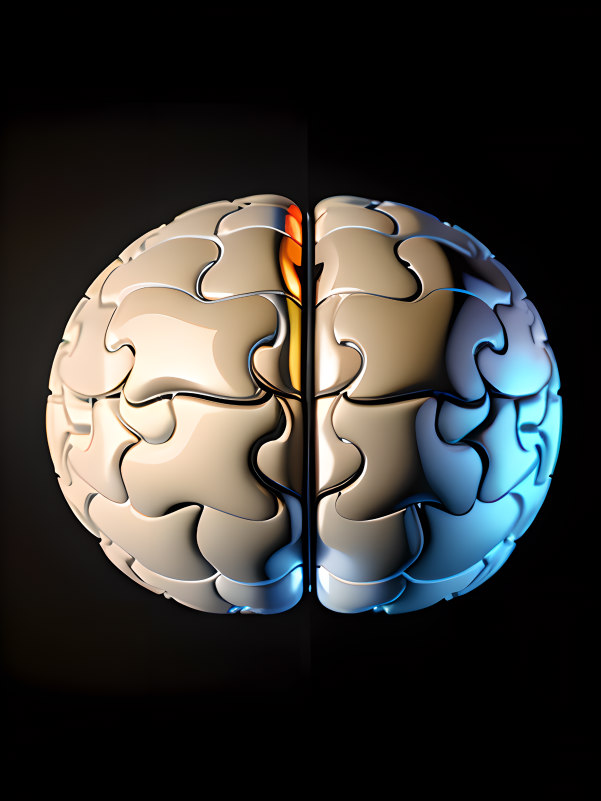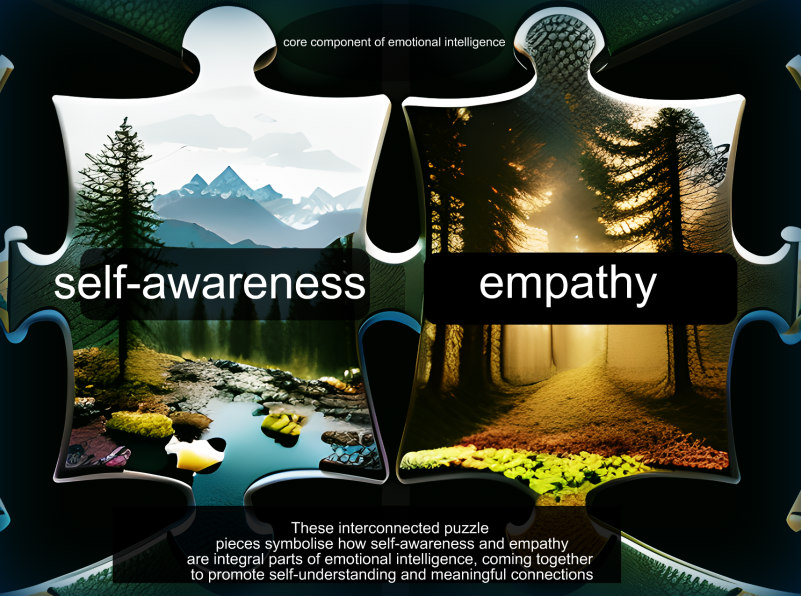Understanding Emotional Intelligence: A Complete Companion
Lesson 2
Hey there! Have you ever wondered why some folks seem to have a knack for gracefully navigating life’s emotional rollercoasters? That, my friend, is the magic of Emotional Intelligence (EQ) at work.
That secret sauce helps people manage emotions, connect with others, and make intelligent decisions. In this blog, we’re diving deep into the world of EQ, exploring everything from its core components to its transformative impact on our daily lives.
Get ready to unlock the power of Emotional Intelligence and discover how it can be your superpower in the hustle and bustle of the modern world.
.
Table of Contents
Key Takeaways
Defining Emotional Intelligence and Its Importance
The Evolution of Emotional Intelligence as a Concept
The Core Components of Emotional Intelligence
Self-Awareness: The Foundation of Emotional Intelligence
Self-Management: Strategies for Regulating Emotions
Social Awareness: The Key to Empathy and Understanding
Relationship Management: Building and Maintaining Connections
The Impact of Emotional Intelligence
Emotional Intelligence in the Workplace
The Role of Emotional Intelligence in Personal Relationships
How Emotional Intelligence Influences Mental and Physical Health
Emotional Intelligence vs. IQ: Understanding the Differences
The Predictive Power of Emotional Intelligence Over IQ
How Emotional Intelligence and IQ Complement Each Other
Developing Emotional Intelligence
Can Emotional Intelligence Be Learned?
Techniques and Practices to Enhance Emotional Intelligence
Measuring Emotional Intelligence
The Various Models and Assessments for Emotional Intelligence
The Significance of Emotional Intelligence Tests in Personal and Professional Settings
Emotional Intelligence in Action: Case Studies and Real-World Examples
The Johnson & Johnson Study on Leadership and Emotional Competence
Anecdotes of Success: High EQ Individuals in the Workplace
The Future of Emotional Intelligence
Why Emotional Intelligence Is Essential for Future Leaders
Predictions for Emotional Intelligence in the Evolving Work Landscape
Expert Insights on Emotional Intelligence
Daniel Goleman’s Perspective on Emotional Intelligence in Leadership
Contributions of Key Researchers in the Field of Emotional Intelligence
Conclusion
Key Takeaways
Defining Emotional Intelligence and Its Importance

Have you ever wondered why some people seem to excel in both their professional and personal lives? The answer lies in their emotional intelligence. While technical skills and knowledge are important, it is emotional intelligence that sets individuals apart and leads to success.
Emotional Intelligence, or EQ, is more than just a buzzword; it’s the compass that guides us through the complexities of human emotions. It empowers us to identify, comprehend, and manage our own emotions while also tuning into the emotional cues of others. This ability is a game-changer because it affects how we navigate social interactions, resolve conflict, and make personal decisions that achieve positive results.
Recognising its significance, EQ has emerged as a highly valued skill, eclipsing technical abilities in many professional settings. It’s the underpinning of empathy, leadership, and a host of other soft skills that are critical for personal and professional success in today’s interconnected world.
The Evolution of Emotional Intelligence as a Concept

The journey of emotional intelligence (EQ) began before it had a name, with roots tracing back to discussions of ‘social intelligence’ in the early 20th century. It wasn’t until 1964 that the term “emotional intelligence” was first introduced by Michael Beldoch, but it stayed relatively obscure for decades.
Then, in the 1990s, psychologists John Mayer and Peter Salovey presented a formal theory, defining EQ as the ability to monitor and discriminate between emotions. Yet, it was Daniel Goleman who catapulted the concept into the limelight with his 1995 book, “Emotional Intelligence: Why It Can Matter More Than IQ.” Goleman’s work popularised EQ, framing it as a critical factor in personal and professional success and sparking a wave of interest that continues to grow.
The Core Components of Emotional Intelligence
Emotional intelligence (EQ) is the scaffold that supports our interpersonal and intrapersonal relationships. At its core, EQ comprises four fundamental pillars: self-awareness, self-management, social awareness, and relationship management.
Self-awareness is the bedrock of EQ, the keen understanding of one’s emotions, strengths, and limitations. It’s about recognising your emotional triggers and understanding how they influence your thoughts and actions.
Self-management is about controlling impulsive feelings and behaviours, managing emotions healthily, and adapting to changing circumstances. This aspect of EQ enables us to stay focused under pressure and exhibit resilience in the face of adversity.
Social awareness involves understanding others’ emotions, needs, and concerns. It’s that intuitive grasp of the social dynamics around us, the context behind the feelings that others display.
Lastly, relationship management is about developing and maintaining good relationships, inspiring and influencing others, and managing conflict effectively. This facet involves clear communication and handling social intricacies, ensuring that our connections with others remain strong and positive.
By honing these components of emotional intelligence, we unlock our potential to navigate life’s emotional complexities with greater ease and success.
Self-Awareness: The Foundation of Emotional Intelligence

Self-awareness is the cornerstone of emotional intelligence, a reflective mirror showing us our actual dynamic landscape. It involves a conscious knowledge of one’s own character, feelings, motives, and desires.
Through self-awareness, we gain insight into our emotional triggers and how they sway our thoughts and behaviours. This heightened sense of self is essential; it’s the first step in managing emotions effectively, leading to improved decision-making and personal growth.
Self-awareness allows us to navigate our emotional experiences with authenticity and purpose, setting the stage for developing other EQ skills.
Self-Management: Strategies for Regulating Emotions

Social Awareness: The Key to Empathy and Understanding
Social awareness is like a bridge connecting the islands of our individual experiences. It allows us to perceive and comprehend the emotions of others, fostering a sense of empathy central to all human connections. With social awareness, we can appreciate the perspectives and lived experiences of those around us, even when they diverge from our own. This keen understanding is vital for nurturing relationships and building communities that thrive on mutual respect and cooperation.
By cultivating social awareness, we sharpen our ability to detect and respond to social cues, be they verbal or non-verbal. It’s about reading the room, understanding the unspoken, and being attuned to any situation’s emotional climate. Mastery of this EQ skill enables us to navigate the social world with finesse, leading to more meaningful interactions and a more profound sense of connection.
Steve Jobs’s attributed his success in leading Apple on the market to his abilities to identify, analyze, and control emotions. Jobs “could size people up, understand their inner thoughts, cajole them, intimidate them, by targeting their deepest vulnerabilities, and delight them at will.
Self-management in EQ is akin to being the captain of your own emotional ship. It’s about steering through the stormy seas of stress and impulse, maintaining your composure, and keeping your eyes on the horizon of your goals. By mastering self-management, you can pause before responding, ensuring your emotions don’t hijack your best intentions.
Effective strategies include deep breathing, mindfulness, and seeking perspective before acting. These techniques allow for a thoughtful approach to emotion regulation, fostering a balanced and proactive response to life’s challenges. With practice, self-management evolves from a conscious effort into a seamless part of your emotional repertoire.
Relationship Management: Building and Maintaining Connections

Relationship Management, the final piece of the EQ puzzle, is where the rubber meets the road regarding our interactions with others. It is the art of building rapport, fostering positive connections, and understanding the intricate dance of human relationships. Here, we not only recognise the emotions of others but also influence and inspire them, nurturing bonds that are both resilient and reciprocal.
This aspect of emotional intelligence involves clear communication, adept conflict resolution, and skilfully managing social networks. It’s about creating an environment where trust flourishes, and collaboration is second nature. Effective relationship management often separates good leaders from great ones, proving that the heart of leadership beats through the connections we cultivate.
The Impact of Emotional Intelligence
Emotional Intelligence (EQ) wields a profound influence on our professional lives. The undercurrent powers leadership, collaboration, and resilience in the workplace. Studies have shown that high-EQ individuals are better at handling pressure, leading teams, and adapting to change.
In personal realms, EQ is equally transformative. It strengthens relationships by fostering deeper understanding and empathy. Those with high emotional intelligence enjoy more satisfying and stable relationships, navigating conflicts with finesse and communicating clearly.
Moreover, EQ is a cornerstone of mental and physical well-being. It helps manage stress, ward off anxiety, and even boost the immune system. Individuals with robust emotional intelligence tend to lead healthier, happier lives.
Emotional Intelligence in the Workplace
Emotional Intelligence (EQ) in the workplace is vital in team dynamics and leadership. The grease smooths out the friction of day-to-day interactions, enabling individuals to collaborate effectively and navigate the complexities of office politics. High EQ individuals shine in negotiation and teamwork roles, as they can readily empathise with colleagues and manage their reactions in high-stress situations.
Moreover, emotional intelligence predicts professional success, often more than technical expertise. This is because EQ encompasses the ability to motivate, influence, and maintain positive relationships, which are essential for leadership roles. As businesses recognise the value of EQ, they’re increasingly prioritising these skills in their hiring and training processes, seeking employees who can contribute to a harmonious and productive workplace.
The Role of Emotional Intelligence in Personal Relationships
Emotional intelligence is the unsung hero of harmonious relationships. It’s the ability to understand and manage your emotions and those of the people you care about. This skill is crucial for navigating the waters of personal connections, where miscommunication and misunderstandings can cause ripples that upset the balance.
With high emotional intelligence, you’re more adept at picking up on the emotional states of your partners, friends, or family. This emotional attunement allows for more empathetic interactions, fostering a climate of mutual understanding and respect. The glue binds, helping repair rifts and building a stronger, more intimate bond.
How Emotional Intelligence Influences Mental and Physical Health
Emotional Intelligence (EQ) is a bulwark against daily stresses and strains, significantly influencing mental and physical health. Individuals high in EQ are adept at identifying and managing their emotions, a skill that’s linked to reduced anxiety and depression. They’re also better equipped to establish supportive relationships, providing a social buffer during tough times.
On the physical side, those with hearty emotional intelligence tend to practice healthier habits and make decisions that promote well-being. They’re more resilient to stress, a known risk factor for many medical conditions. By mastering emotional self-regulation, they maintain not just a sound mind but a healthier body as well.
Emotional Intelligence (EQ) vs. Intelligence Quotient (IQ): Understanding the Differences
Emotional Intelligence (EQ) and Intelligence Quotient (IQ) are distinct facets of human capabilities, each playing a unique role in navigating the world. IQ refers to cognitive abilities such as logical reasoning, problem-solving, and analytical thinking, often measured through standardised tests. On the other hand, EQ encompasses the softer skills related to emotion, such as empathy, self-awareness, and the ability to manage relationships.
High IQ predicts the benefits of academic success, financial reward, career achievement, and less likelihood of criminal behaviour. In contrast, EQ is often a more reliable personal and career achievement indicator. Emotional intelligence influences our capacity to work well with others, adapt to change, and overcome challenges—skills critical for success in today’s collaborative and dynamic environments.
The Predictive Power of Emotional Intelligence Over IQ
Emotional Intelligence (EQ) has emerged as a stronger predictor of personal and professional success than the traditional Intelligence Quotient (IQ). It’s EQ that often determines who will excel, as it facilitates more adaptive responses to challenges and stress.
Studies have shown that individuals with high EQ are more likely to succeed in leadership roles where interpersonal dynamics are crucial. In contrast, a high IQ can forecast academic achievement, yet social and emotional insight ultimately drives meaningful success in most careers.
According to intelligence studies, the correlation of high IQ with intelligent behaviour is often different. Brilliant people often need help with rational decisions and will often practice little common sense.
Therefore, the predictive power of EQ over IQ underscores the value of emotional intelligence in our increasingly collaborative world.
How Emotional Intelligence and IQ Complement Each Other.
In the tapestry of human potential, Emotional Intelligence (EQ) and Intelligence Quotient (IQ) are interwoven threads that enhance the richness of the whole. IQ offers raw analytical horsepower and the capability for logical reasoning and problem-solving, which is foundational in structured environments.
EQ, by contrast, adds colour and texture through its influence on our interpersonal skills, such as empathy, motivation, and the ability to navigate social complexities. Together, they create a fuller picture of individual capability, illustrating that success is not solely determined by cognitive prowess but also by our ability to connect, understand, and lead.
Recognising the symbiotic relationship between EQ and IQ is key to personal and professional development, emphasising that one’s ability to thrive involves a balance of both emotional savvy and intellectual understanding.
Developing Emotional Intelligence
Can you boost your EQ? Absolutely. The journey to enhancing emotional intelligence is continuously rooted in self-reflection and mindfulness. It starts with a willingness to assess and understand your own emotions, coupled with a genuine curiosity about the feelings of others.
Practical steps like active listening, empathy practice, and managing stress effectively can significantly improve EQ. These skills are not fixed at birth, but can be cultivated through dedication and practice, like learning to play an instrument or mastering a new language. With commitment, anyone can enhance their emotional intelligence, opening doors to improved communication and stronger relationships.
Can Emotional Intelligence Be Learned?
The debate around emotional intelligence often zeroes in on its malleability. Can we truly enhance our EQ? The consensus among psychologists suggests a resounding yes. Emotional intelligence is not a static trait; it’s akin to a muscle that strengthens with consistent exercise and practice. However, when it comes to IQ, our capacities may be inherited.
Improving one’s EQ hinges on a commitment to personal development. It involves cultivating mindfulness, honing social skills, and managing emotions effectively. With targeted efforts like empathy training and stress management, anyone can elevate their emotional intelligence, paving the way for enriched personal interactions and professional success.
Techniques and Practices to Enhance Emotional Intelligence

Boosting emotional intelligence starts with active self-reflection. Recognise your emotional triggers and examine how they affect your behaviour.
Practice mindfulness; it anchors you in the present, helping you become more aware of your emotional state.
Engage in active listening, which fosters empathy and understanding in conversations. Develop a habit of asking for feedback, as it can reveal blind spots in your self-perception.
This person is able to recognise and understand the emotions of others, a skill tied to empathy and not sympathy. The person with a high EQ can hear and understand another person’s point of view clearly. The empathic are generally supportive of the people in their lives, and they easily modulate their emotions to match the mood of another person as well.
Lastly, learn to manage stress through techniques like deep breathing or meditation. These practices can improve emotional regulation, leading to enhanced EQ over time.
.
Measuring Emotional Intelligence
The quest to quantify Emotional Intelligence (EQ) has led to diverse assessments, each with its own approach to capturing this complex construct. Notably, the Mayer-Salovey-Caruso Emotional Intelligence Test (MSCEIT) is a prominent tool designed to measure the four branches of EQ objectively. This performance-based test evaluates how individuals process emotional information to navigate the social environment.
In the realm of self-report inventories, tools like the Emotional and Social Competence Inventory (ESCI) offer insight from a different angle, allowing individuals to reflect on their own emotional abilities. Paired with 360-degree feedback, these assessments can paint a comprehensive picture of one’s emotional landscape, guiding personal and professional development. Each method sheds light on the multifaceted nature of EQ, underscoring the importance of emotional skills in our daily lives.
The Various Models and Assessments for Emotional Intelligence
Several models and assessments have been developed to understand and measure Emotional Intelligence (EQ). The most widely recognised model, proposed by Mayer and Salovey, breaks down EQ into four key areas: perceiving emotions, using emotions to facilitate thought, understanding emotions, and managing emotions. This model forms the basis for the Mayer-Salovey-Caruso Emotional Intelligence Test (MSCEIT), a tool that assesses one’s ability to navigate emotional landscapes.
Another influential framework is Daniel Goleman’s model, which encompasses five main components: self-awareness, self-regulation, motivation, empathy, and social skills. Assessments based on Goleman’s model, like the Emotional and Social Competence Inventory (ESCI), provide insights into one’s EQ through self-evaluation and peer feedback. These models and tools offer a diverse perspective on emotional intelligence, highlighting its integral role in personal and professional success.

EQ-i 2.0 assessment tool
The EQ-i 2.0 provides you with a detailed assessment of your areas of strength and potential areas for development. This will assess your areas of strength and potential areas for development.
The 15 competencies in the scientifically validated EQ-i 2.0 model are highly correlated with inspirational leadership, innovative work cultures, highly-effective teams, and engaged and committed talent.
The Workplace Report puts the emphasis on your workplace performance and the Leadership Report focuses on your leadership effectiveness, each in the context of emotional intelligence.
The EQ-i 2.0 is an online self-rating assessment tool, with the option of adding a multi-rater EQ 360.
The Significance of Emotional Intelligence Tests in Personal and Professional Settings
Emotional intelligence tests offer a mirror, reflecting our capacity to recognise and manage emotions within ourselves and our interactions with others. In personal settings, these assessments can illuminate pathways to self-improvement, guiding individuals toward enhanced self-awareness and healthier relationships. Professionally, they serve as a compass, directing teams and leaders towards a more empathetic and collaborative work culture.
By pinpointing strengths and areas for growth, these tools foster an environment where emotional skills are valued and cultivated. This focus on emotional development is integral to building resilient, persuasive, and harmonious communities, both in and out of the workplace.
Emotional Intelligence in Action: Case Studies and Real-World Examples
.
The business terrain is rife with examples where Emotional Intelligence (EQ) has made a tangible difference. Take the case study of Johnson & Johnson’s Consumer Companies (JJCC), where a study unearthed a strong relationship between superior performing leaders and emotional competence. These leaders excelled in self-awareness, empathy, and relationship management, outperforming their peers in nearly every measure.
Real-world examples further underscore the power of high EQ. From customer service reps diffusing tense situations to managers inspiring their teams, those with heightened emotional intelligence navigate workplace challenges with finesse and achieve remarkable outcomes. Their success stories testify to EQ’s pivotal role in shaping influential leaders and cohesive workforces.
The Johnson & Johnson Study on Leadership and Emotional Competence
When Johnson & Johnson’s Consumer Companies (JJCC) decided to probe the link between leadership and emotional competence, they unearthed some compelling findings. Their study revealed that leaders with high emotional intelligence were not just good—they were exceptional. These leaders stood out for their self-awareness, empathy, and masterful relationship management, distinguishing themselves in the heat of corporate competition.
The data was precise: emotional competence wasn’t just a nice to have; it was a strong predictor of stellar performance. For a deeper dive into how emotional intelligence shapes effective leadership, check out this insightful exploration of the subject.
Anecdotes of Success: High EQ Individuals in the Workplace
Individuals with high emotional intelligence (EQ) stand out vividly in the world of corporate achievements. Their stories often share a common theme: the ability to harmonise personal emotions with workplace demands. These high-EQ individuals navigate complex social dynamics with finesse, turning potential conflicts into opportunities for collaboration.
Their success often hinges on empathy, understanding colleagues’ perspectives, and responding with emotional insight. Leaders with high EQ, for instance, excel in creating environments where motivation and morale soar, fostering productive and loyal teams. These anecdotes highlight the importance of EQ and serve as a blueprint for aspiring professionals who wish to lead with emotional intelligence.
The Future of Emotional Intelligence (EQ)
The emotional Intelligence (EQ) trajectory is set to redefine leadership and interpersonal dynamics. As automation and artificial intelligence perform more routine tasks, the human workforce will pivot to roles demanding nuanced emotional capabilities. This shift underscores the growing premium on EQ, particularly as a critical skill for future leaders, where understanding and leveraging human emotion will be paramount.
Predictions suggest that workplaces will prioritise EQ to foster innovation and employee well-being. Emotional intelligence will be integral to navigating the evolving work landscape, ensuring that as technology advances, our human touch doesn’t just endure—it flourishes.
.
Why Emotional Intelligence Is Essential for Future Leaders
Future leaders will navigate an increasingly complex social fabric, where the capacity to understand and leverage emotions will be indispensable. Emotional Intelligence (EQ) is the linchpin for effective leadership in this dynamic landscape, as it underpins the ability to forge genuine connections, inspire teams, and drive change. Leaders adept in EQ not only excel in managing their own emotions but also in recognising and influencing the emotions of others, a critical skill in fostering a productive and innovative workplace.
In a world where technology continues to reshape the workplace, the human elements of empathy, understanding, and interpersonal skills become the differentiators of outstanding leadership. This is why emotional intelligence is beneficial and essential for those who aspire to lead in the future, ensuring that the value of human connection remains at the forefront of success amidst the march of progress.
Predictions for Emotional Intelligence in the Evolving Work Landscape
As the work landscape evolves, emotional intelligence (EQ) is predicted to become a cornerstone of organisational culture. With the rise of remote work and digital communication, reading emotional cues and maintaining empathy have become critical. Leaders and teams will lean on EQ to bridge the digital divide, ensuring that virtual workspaces are as emotionally attuned as physical ones.
Innovation and collaboration will increasingly hinge on EQ, as it drives the social skills necessary for diverse teams to excel. As AI and automation reshape roles, the distinctly human skill of emotional intelligence will be what sets successful professionals apart. The future is clear: those with a robust EQ will navigate the new work paradigm with agility, making emotional intelligence an invaluable asset in the tech-forward era.
Expert Insights on Emotional Intelligence
Delving into emotional intelligence (EQ), insights from leading experts illuminate its profound impact on leadership and personal development. Daniel Goleman, a pre-eminent voice in the field, argues that EQ trumps IQ in determining success, especially within leadership roles. His perspective reinforces that self-awareness, empathy, and interpersonal skills are indispensable for effective leadership.
Goleman’s work and contributions from researchers like John Mayer and Peter Salovey have shaped our understanding of EQ. They’ve highlighted the malleability of emotional intelligence, asserting that it can be developed with concerted effort and practice. This notion champions the idea that EQ is not an innate trait but a skill set that can be honed, offering hope for continuous personal growth.
Daniel Goleman’s Perspective on Emotional Intelligence in Leadership
Daniel Goleman, the father of emotional intelligence and a luminary in, revolutionised how we perceive leadership effectiveness. His research underscores that EQ may surpass IQ as the sine qua non of leadership.
Goleman posits that leaders with high emotional intelligence are more adept at fostering a productive work environment and eliciting peak performance from their teams. They navigate the emotional complexities of leadership roles with an empathetic, self-aware approach, making emotional intelligence the cornerstone of effective leadership.
In essence, Goleman’s work illuminates the transformative power of EQ in shaping leaders who lead and inspire.
Contributions of Key Researchers in the Field of Emotional Intelligence
Emotional intelligence (EQ) has flourished thanks to the seminal work of pioneers like John D Mayer, Peter Salovey, in 1990 (p.189) and Goleman book "Emotional Intelligence: Why It Can Matter More Than IQ" popularized the concept.. Their insights have provided a framework for understanding EQ’s indispensable role in personal and professional realms.
In wrapping up, we’ve navigated the vast seas of Emotional Intelligence, exploring its essence, impact, and promise for the future. This journey has underscored EQ’s potent influence on leadership, relationships, and personal well-being. Remember, EQ is a skill we can all develop with practice and intention.
So, why not start today? Take the first step towards enhancing your EQ and watch new horizons unfold in every facet of your life.
Conclusion: Emotional intelligence refers to a person's ability to recognize and understand their own emotions as well as those of others. It involves effectively managing emotions, building positive relationships, and making sound decisions based on emotional awareness. Developing emotional intelligence can have a profound impact on both work and personal relationships.
In today's highly competitive world, being emotionally intelligent is no longer just a desirable trait, but a crucial one for success. It can help you navigate complex social dynamics, enhance your leadership skills, and achieve greater personal fulfilment. In this article, we will explore the importance of emotional intelligence and discuss practical ways to develop and apply it in both your work and personal life.
Whether you are aiming for professional success or personal success, developing your emotional intelligence can be a game-changer. It empowers you to navigate through various challenges and build strong relationships.






Sources
- 1.https://www.helpguide.org/articles/mental-health/emotional-intelligence-eq.htm
- 2.https://en.wikipedia.org/wiki/Emotional_intelligence
- 3.https://www.verywellmind.com/what-is-emotional-intelligence-2795423
- 4.https://www.psychologytoday.com/us/basics/emotional-intelligence
- 5.https://psychcentral.com/lib/what-is-emotional-intelligence-eq
- 6.https://www.amazon.com/Emotional-Intelligence-Matter-More-Than/dp/055338371X
- 7.https://online.hbs.edu/blog/post/emotional-intelligence-in-leadership
- 8.https://hbr.org/2017/02/emotional-intelligence-has-12-elements-which-do-you-need-to-work-on
- 9.https://www.health.harvard.edu/mind-and-mood/emotional-intelligence
- https://tannermenzies.net.au/role-emotional-intelligence-executive-search-leadership
- https://www.verywellmind.com/what-is-emotional-intelligence-2795423
FAQs.
What does emotional intelligence mean?
Emotional Intelligence (EI) is the ability to manage your emotions and understand the feelings of people around you. EI has five key elements: self-awareness, self-regulation, motivation, empathy, and social skills.
What are the four types of emotional intelligence?
The four domains of Emotional Intelligence — self-awareness, self-management, social awareness, and relationship management — can help a leader face any crisis with lower levels of stress, less emotional reactivity and fewer unintended consequences.
What are three positive ways to deal with emotions?
HERE ARE 3 STEPS THAT CAN HELP.
Step 1: Identify the Emotion. Learning to notice and identify your feelings takes practice.
Step 2: Take Action. Once you’ve identified and understood your feelings, you can decide how to express your emotions.
Step 3: Get Help With Difficult Emotions.
What causes low emotional intelligence?
Research also links alcohol dependence and other substance use disorders to lower emotional intelligence. This link can go both ways: Addiction can cause changes in the brain that affect your ability to interpret and manage emotions and impulses.
Can I learn to be more emotionally intelligent?
Yes, you can. You can start by learning to identify the emotions you are feeling as well as understanding them. If you are able to name the emotion you are feeling, you have a better chance of understanding what you are feeling. You can also learn to better regulate your emotions just by stopping and thinking before you act and judge. These skills will help you martial inner resolve and stick to what really matters in life.
.
